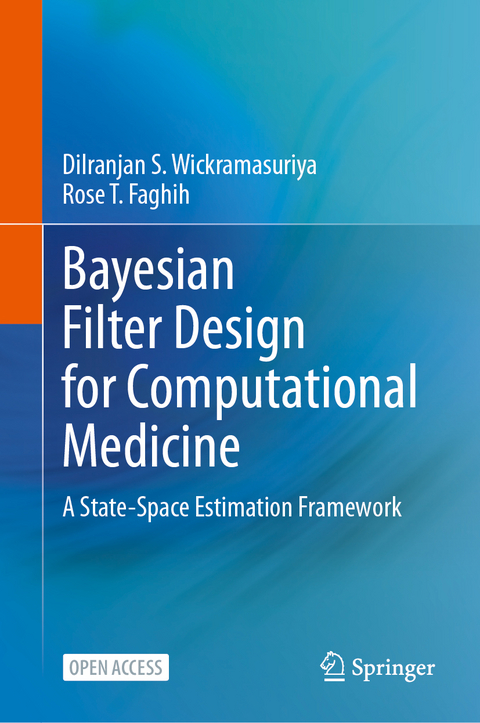
Bayesian Filter Design for Computational Medicine
Springer International Publishing (Verlag)
978-3-031-47103-2 (ISBN)
This book serves as a tutorial that explains how different state estimators (Bayesian filters) can be built when all or part of the observations are binary. The book begins by briefly motivating the need for point process state estimation followed by an introduction to the overall approach, as well as some basic background material in statistics that are necessary for the equation derivations that are utilized in subsequent chapters. The subsequent chapters focus on different state-space models and provide step-by-step explanations on how to build the corresponding Bayesian filters.
Each of the main chapters that describes a single state-space model also describes the corresponding MATLAB code examples at the end. Descriptions are also provided regarding the code. The code contains both simulated and experimental data examples. All the experimental data examples are taken from real-world experiments. The experiments involve the recording of skin conductance, heartrate and blood cortisol data. A MATLAB toolbox of code examples that cover the different filters covered in the book is included in a companion webpage.
The book is primarily intended for graduate students in either electrical engineering or biomedical engineering who will be beginning research in state estimation related to point process data or mixed data (i.e., point processes and other types of observations). The book can also be used by practicing researchers who measure skin conductance and heart rate or pulsatile hormones in their own work (e.g. in psychology).
This is an open access book.
lt;p>Dilranjan S. Wickramasuriya received his B.S. degree in electronic and telecommunication engineering from the University of Moratuwa, in 2014, and the M.S. degree in electrical engineering from the University of South Florida, in 2017. In 2020, he completed his Ph.D. degree in electrical engineering at the University of Houston. He works as a Software Engineer at hSenid Mobile Solutions.
Rose T. Faghih received her B.S. degree in electrical engineering from the University of Maryland, College Park, MD, USA, in 2008, and the S.M. and Ph.D. degrees in electrical engineering and computer science with a minor in mathematics from the Massachusetts Institute of Technology (MIT), Cambridge, MA, USA, in 2010 and 2014, respectively. Dr. Faghih is an Assistant Professor at the Department of Electrical and Computer Engineering at University of Houston where she directs the Computational Medicine Laboratory. She completed her postdoctoral training at the Department of Brain and Cognitive Sciences and the Picower Institute for Learning and Memory at MIT as well as the Department of Anesthesia, Critical Care and Pain Medicine at Massachusetts General Hospital. At MIT, she was with the Laboratory for Information and Decision Systems as well as the MIT-Harvard Neuroscience Statistics Research Laboratory. Her research interests include wearable technologies, medical cyber-physical systems, control, estimation, and system identification of biomedical and neural systems. Dr. Faghih is the recipient of various awards including an MIT Technology Review 2020 Innovator Under 35 award, a 2020 National Science Foundation (NSF) CAREER Award, a 2020 Research Excellence award as well as a 2020 Teaching Excellence Award from the University of Houston's Cullen College of Engineering, and the 2016 IEEE-USA New Face of Engineering award, a National Science Foundation Graduate Research Fellowship, an MIT Graduate Fellowship, and the University of Maryland's Department of Electrical and Computer Engineering Chair's Award.
Introduction.- Some Useful Statistical Results.- State-space Model with One Binary Observation.- State-space Model with One Binary and One Continuous Observation.- State-space Model with One Binary and Two Continuous Observations.- State-space Model with One Binary, Two Continuous and a Spiking-type Observation.- State-space Model with One Marked Point Process (MPP) Observation.- Additional Models and Derivations.- MATLAB Code Examples.- List of Supplementary MATLAB Functions.
| Erscheinungsdatum | 31.03.2024 |
|---|---|
| Zusatzinfo | XV, 228 p. 17 illus. in color. |
| Verlagsort | Cham |
| Sprache | englisch |
| Maße | 155 x 235 mm |
| Themenwelt | Medizin / Pharmazie ► Studium |
| Naturwissenschaften ► Biologie ► Humanbiologie | |
| Schlagworte | Bayesian decoder design • Bayesian Filter Design • Bayesian Filter Design neuroengineering • Bayesian filtering • Biomedical Signal Processing • computational medicine bayesian • Electrodermal activity analysis • Galvanic skin response processing • Galvanic skin response signal • Mixed filters • open access • Physiological decoders • skin response signal processing • State-space estimation |
| ISBN-10 | 3-031-47103-2 / 3031471032 |
| ISBN-13 | 978-3-031-47103-2 / 9783031471032 |
| Zustand | Neuware |
| Informationen gemäß Produktsicherheitsverordnung (GPSR) | |
| Haben Sie eine Frage zum Produkt? |
aus dem Bereich


